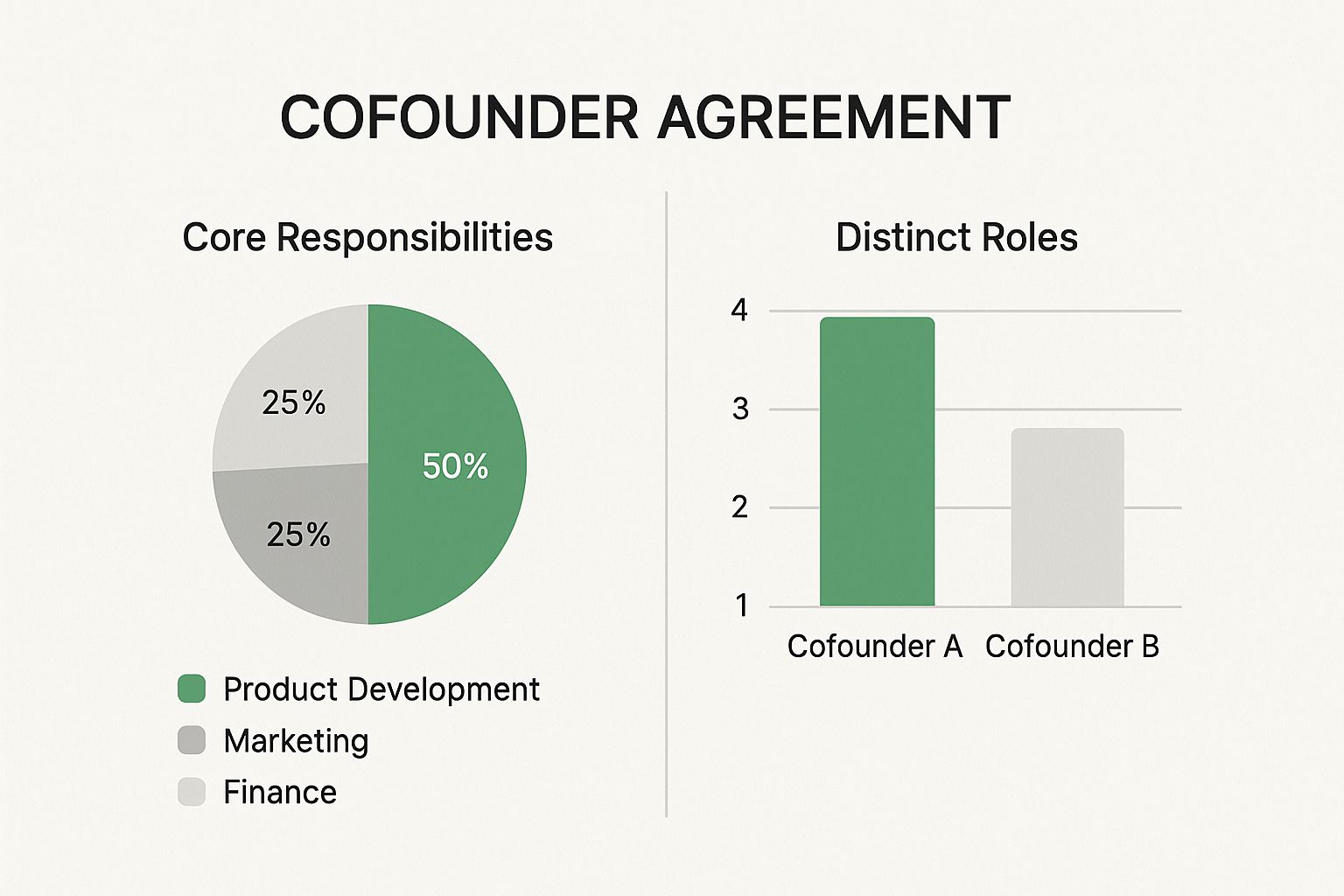Why Smart Founders Skip Agreements (And Regret It)

There's this myth that successful founders just wing it, especially in the beginning. Having worked with hundreds of startup teams, I’ve seen a surprising pattern: brilliant people, meticulous about their business plans, completely overlooking the most crucial relationship – their partnership. Handshakes and good intentions are great, but they aren't legally binding. A solid foundation matters online too; don't neglect the basics of website development for startups.
This casual approach often stems from a fear of difficult conversations or an overabundance of trust. Founders sometimes think a formal agreement suggests a lack of faith. But a cofounder agreement isn’t about mistrust; it's about clarity. Think of it as a roadmap for navigating the inevitable potholes in the startup journey.
Early-stage startups are constantly changing. Roles shift, contributions evolve, and that initial burst of enthusiasm can fade. Without a clear, documented understanding of who does what and who owns what, disagreements can quickly escalate, damaging both the business and the friendship.
The Surprising Scarcity of Cofounder Agreements
Here's a startling statistic: only about 39% of founders have a cofounder agreement in place from the get-go. This lack of formality breeds misunderstandings and conflicts, because, let's be honest, verbal agreements rarely hold up in court. This can create chaos around decision-making, equity splits, and even who owns the intellectual property, dramatically increasing the risk of failure. In fact, cofounder disputes are a major contributor to startup failures – 62%, to be exact. You can find more on this here.
The Cofounder Agreement: A Prenup for Your Business
Think of a cofounder agreement as a prenuptial agreement for your business. It’s not about expecting a breakup, but about setting clear expectations and procedures just in case. It’s a sign of maturity and a commitment to building a business that lasts. It sets the stage for open communication and proactive problem-solving. And that creates a much stronger foundation for the future.
Cracking The Equity Split Code (Beyond Equal Shares)

The infographic above gives you a visual idea of how responsibilities can be divided between founders. It’s a simplified view, sure, but it gets to the heart of how different everyone's contributions can be. Notice how even when things seem balanced on the surface, a closer look reveals differences in workload and focus. This highlights just how crucial it is to really think through these details in your startup cofounder agreement.
Many founders default to a 50/50 split, thinking it's the fairest way to go. In my experience, that’s often a recipe for trouble down the road. Equal splits can actually create more problems because they often fail to reflect the reality of each founder’s individual input. The biggest mistake? Confusing “fair” with “equal.” Fairness isn’t about identical shares; it's about truly acknowledging the value each person brings. For more insights on co-founder equity splits, check out this helpful resource: Co-founder Equity Split.
So, how do you figure out a split that truly works? It starts with an honest conversation about everyone's contributions. This includes not just the initial capital, but the "sweat equity" – the hours poured in, the late nights, the weekends sacrificed. And don’t forget the less tangible stuff: future commitment, risk tolerance, and individual circumstances. Think about the roles each founder plays, too. Is one person the CEO, shouldering more responsibility and pressure? Are both founders working full-time, or is someone juggling other commitments? All of this feeds into the value equation.
Considering Dynamic Equity
Startups are always changing. What works today might not work next year. That’s why dynamic equity models are so valuable. These models let you adjust the equity split as the company grows and each founder’s contributions evolve. That kind of flexibility can prevent a lot of resentment down the line. For example, imagine one founder contributes a chunk of initial capital but less time, while the other pours in tons of hours but brings no initial investment. A dynamic model can account for those differences over time.
Research actually suggests that while 50/50 splits are common (mostly because they seem simple), startups with uneven splits often have fewer conflicts. Why? Because uneven splits usually come from deeper discussions, leading to a more equitable outcome from the start. This article dives deeper into this topic and offers valuable perspectives: Co-founder Share Splits for Startups. These conversations can be tough, but tackling them head-on builds a stronger foundation for your partnership.
Let's look at a few different ways you can approach splitting equity:
The following table compares different approaches to splitting equity:
Equity Split Approaches Comparison
| Split Method |
Best For |
Advantages |
Potential Issues |
| Equal Split (50/50) |
Early-stage startups with equal founder contributions |
Simple, promotes sense of partnership |
May not reflect differences in contribution over time |
| Experience-Based Split (e.g., 60/40) |
Situations where one founder has significantly more experience or expertise |
Recognizes value of experience and expertise |
Can be difficult to quantify the value of experience |
| Asset-Based Split (e.g., 70/30) |
When one founder brings substantial assets like IP, technology, or an existing customer base |
Acknowledges the value of pre-existing assets |
Valuing intangible assets can be challenging |
| Dynamic Split (with vesting and adjustments) |
All startups, especially as they grow and evolve |
Adapts to changing contributions and circumstances, promotes fairness over time |
Requires ongoing communication and potential renegotiation |
The table highlights the pros and cons of various equity split methods. As you can see, while a simple 50/50 split seems easiest, it's often the least flexible. A dynamic approach, while requiring more upfront discussion, offers the greatest potential for long-term fairness and partnership harmony. Remember, choosing the right split isn’t just about the numbers; it’s about building a strong foundation for your startup's future.
The Clauses That Actually Matter (And The Ones That Don't)

Beyond the equity split, a solid cofounder agreement is the bedrock of any successful startup. It’s about protecting everyone, not preparing for a legal battle. Trust me, I’ve seen enough cofounder fallouts to know the value of a well-drafted agreement. It's about anticipating potential issues before they become problems.
Vesting Schedules: Playing the Long Game
Vesting schedules are like a long-term commitment bonus. They determine how and when you earn your equity. Think of it like this: a typical schedule might be four years with a one-year cliff. This means after a year, you start gradually earning your shares over the remaining three.
This incentivizes everyone to stay engaged and contribute to the company's growth. When figuring out equity splits, also consider the work each founder has already put in, much like validating product ideas with minimum viable product examples. It’s about recognizing past efforts while motivating future contributions.
Intellectual Property: Protecting Your Creations
The intellectual property (IP) assignment clause is crucial, especially in tech. It clarifies who owns the code, designs, and other creations developed during the partnership. Without this, things can get messy. Imagine spending months building a product, only to have a departing cofounder claim ownership of the code. This clause prevents that nightmare scenario.
Decision-Making: Avoiding Gridlock
Disagreements are inevitable. A clear decision-making framework in your agreement helps navigate these choppy waters. This could involve assigning specific roles and responsibilities or setting up voting rights based on equity. It’s also smart to outline a process for resolving deadlocks, maybe involving an outside advisor.
Exit Strategies: Planning for All Possibilities
Thinking about the exit strategy early on isn't pessimistic, it's pragmatic. This clause outlines what happens if someone leaves or if you sell the company. It covers things like buyout options, valuations, and profit distribution. It also addresses what happens if a founder decides to pursue a different opportunity or wants to compete with the existing business. It’s about having a roadmap for various scenarios.
Avoiding Overkill: Keeping it Simple
Not every legal clause is essential for early-stage startups. Don’t let your agreement become overly complicated. A good lawyer can help you identify the must-have clauses for your specific situation. Focus on the essentials that protect your partnership and the business. The goal is a clear and effective agreement, not a legal labyrinth.
Before we move on, let's look at a table summarizing some of the most critical clauses in your cofounder agreement:
A cofounder agreement is a legally binding contract that outlines the terms of a business partnership. It defines each founder's responsibilities, ownership, and what happens in various scenarios like a founder's departure or the sale of the company. It’s an essential document for any startup. Here are some of the key clauses:
Critical Cofounder Agreement Clauses
Essential clauses to include in your cofounder agreement with explanations and examples
| Clause Type |
Purpose |
Example Language |
Common Mistakes |
| Vesting Schedule |
Determines when and how founders earn their equity over time |
"Founder's equity vests over four years with a one-year cliff." |
Not including vesting or using a cliff that is too short. |
| Intellectual Property Assignment |
Clarifies ownership of intellectual property created during the partnership |
"All intellectual property created by founders during their association with the company shall be assigned to the company." |
Failing to clearly define what constitutes company IP. |
| Decision-Making Process |
Outlines how business decisions are made and disputes resolved |
"Major decisions require a majority vote of the founders." |
Not outlining a process for breaking deadlocks. |
| Exit Strategy |
Defines what happens if a founder leaves or the company is sold |
"In the event of a sale, proceeds will be distributed according to equity ownership after accounting for debts and liabilities." |
Not considering different exit scenarios or failing to specify a valuation method. |
| Non-Compete and Confidentiality |
Protects company secrets and prevents founders from competing after leaving |
"Founders agree not to disclose confidential information or compete with the company for a period of two years after leaving." |
Using overly broad or restrictive terms. |
This table provides a quick overview of some of the most important considerations. Remember, working with a legal professional is crucial to ensure your agreement is tailored to your specific needs and jurisdiction.
Starting The Conversation (Without Killing The Vibe)
Let's be honest, talking about a cofounder agreement can feel like bringing up a prenup on a first date. Not exactly the most romantic move. But take it from someone who's been there, done that: it's way less painful than untangling a messy cofounder breakup down the road. The real challenge isn't the legal stuff, it's initiating the conversation without seeming like you're questioning your partner's character.
I've witnessed countless successful founding teams navigate this tricky conversation, and they all have one thing in common: they position the agreement as something that strengthens the partnership, not as a sign of distrust. Think of it like setting ground rules for a basketball game. You don't expect fouls, but having clear rules makes the game smoother and more enjoyable. Looking for the right teammate? This article on how to find a cofounder offers some great advice.
Timing is Everything
Don’t wait until you’re deep into product development or fundraising to bring this up. The best time is early on, ideally before any major commitments. It’s much easier to have these conversations when everyone is still excited and optimistic, before the pressure of a growing startup heats things up.
Framing the Conversation
Focus on the benefits of the agreement. Explain it's about clarifying roles, responsibilities, and expectations from the get-go. It protects both of you and helps ensure the business thrives. Here are a few ways to start the conversation:
- "I've been thinking about how we can make sure we're on the same page for the long haul. Have you ever considered a cofounder agreement?"
- "I've seen other startups run into some tough situations, and I'd like to avoid that. I think a cofounder agreement could really help clarify things for us."
- "I'm really excited to build this with you, and I want to make sure we have a solid foundation. A cofounder agreement can help us solidify our partnership."
Handling Pushback
You might get responses like, "Don't you trust me?" or "We're friends, we don't need a contract." Those are totally understandable reactions. Address them head-on. Reiterate that the agreement isn't about trust, it's about clarity. It's about protecting the friendship and the business. Even the strongest friendships can be strained by the pressures of a startup. A cofounder agreement provides a framework for resolving disagreements before they become personal conflicts.
Turning the Conversation into a Bonding Experience
Successful teams often use this opportunity to understand each other's working styles and long-term goals better. Encourage open communication about individual expectations and concerns. This process can actually strengthen your relationship by building transparency and mutual respect. It sets the stage for a more productive and harmonious partnership in the future.
Warning Signs During Agreement Talks

Putting together a cofounder agreement is more than just dotting the i's and crossing the t's. It's like a relationship test drive with your potential business partner. And sometimes, that test drive reveals some unexpected issues. I've seen this process uncover fundamental differences that could have stayed hidden otherwise. Let's talk about those red flags and how to separate healthy debate from serious incompatibility.
Recognizing Red Flags
Disagreements are bound to happen during these conversations – that's perfectly normal. But some patterns can point to deeper issues. For example, I once worked with a founder whose potential partner kept dodging conversations about equity and responsibilities. That's a huge red flag. It suggests a lack of commitment or, worse, a lack of transparency.
Another warning sign? An unwillingness to compromise. Building a successful startup demands flexibility and a shared vision. If you're butting heads constantly during the agreement phase, imagine the friction you'll face later on.
Healthy Disagreement vs. Fundamental Incompatibility
It’s crucial to distinguish between healthy disagreement and a true clash of visions. Healthy disagreements often center around how to reach a shared goal. Debating the best marketing strategy, for instance, or arguing about product features can actually be a good sign. It shows you're both engaged and thinking critically.
Fundamental incompatibility is different. This shows up when you're constantly at odds about core values, long-term vision, or basic business principles. These types of disagreements rarely resolve themselves and can sink your startup before it even leaves the dock.
Navigating Disputes and Seeking Outside Perspective
Successful cofounders handle disputes constructively. They actively listen to each other, try to find common ground, and keep the best interests of the business at heart. Sometimes, bringing in an outside advisor, like a mentor or a seasoned entrepreneur, can be incredibly helpful.
A neutral third party can offer unbiased insights and help you have a more productive conversation. Think of it like having a referee to keep things fair and focused.
Knowing When to Walk Away
Sometimes, the smartest move is the hardest one: walking away. Forcing an agreement that just doesn’t feel right is a recipe for disaster. If you find yourself constantly compromising your core values or feeling fundamentally misaligned with your potential cofounder, it might be time to consider other options.
A tough decision now can save you a world of pain and wasted time down the road. Remember, choosing the right partner is just as crucial as the idea itself. A solid partnership, built on shared values and mutual respect, is fundamental to startup success.
Making It Legal (Without Breaking The Bank)
So, you're ready to make your startup official and need a cofounder agreement? Fantastic! Let's talk about how to get this crucial document sorted without spending a fortune. It's less scary than you might think.
DIY vs. Lawyer Up: Knowing When to Seek Professional Help
You can absolutely handle some of the initial legwork yourself. Think of it like building a house. You can probably paint the walls, but you wouldn't rewire the whole place yourself, right?
A good starting point is a simple, well-crafted template like this simple partnership agreement template. It provides a solid framework that you can tailor to your specific needs, saving you money and getting the ball rolling. But, just like you'd call in a licensed electrician for wiring, you'll need a lawyer for the critical legal bits to make sure everything is legally sound and complies with your state laws.
Keeping Legal Costs Manageable
Worried about lawyer fees? I get it. Here’s how to keep those costs under control:
- Come prepared: Have your business plan, founder bios, and a draft of your agreement ready to go. Even a filled-out template is a good start. Think of it like prepping for a cooking show – have your ingredients mise en place so you can use your lawyer's time efficiently.
- Ask about fixed fees: Some lawyers offer fixed-fee packages for standard startup agreements, making budgeting much easier. It's like ordering prix fixe instead of à la carte – you know what you're getting and how much it will cost.
- Maximize your lawyer's time: Prepare a list of specific questions and schedule a focused meeting instead of relying on endless emails. This will help you make the most of their expertise without racking up unnecessary charges.
State Laws and Your Agreement
State laws matter – a lot. They influence everything from business formation and intellectual property (IP) ownership to how disputes are resolved. For example, Delaware is popular with startups because of its business-friendly legal environment.
The screenshot below from the SEC website highlights how important it is to understand the roles and responsibilities of officers and directors, which should be clearly spelled out in your cofounder agreement. Getting this right from the start can prevent headaches down the road.
The SEC information emphasizes the importance of well-defined roles and responsibilities, a cornerstone of any solid startup cofounder agreement. It underscores the need for due diligence and understanding the legal implications of these roles.
Document Storage and Amendments
Once you've signed the agreement, store it securely, preferably using a cloud storage service like Dropbox or Google Drive. Easy access is key.
Your startup will evolve, and so will your agreement. Make sure you have a clear amendment process in place that includes defined steps and requires all founders' signatures. This avoids confusion and keeps your agreement relevant as your business grows.
Your Partnership Protection Playbook
So, you've had the tough conversations and drafted your startup cofounder agreement. Great! Now, let's talk about making this thing work for the long haul. Think of this like your game plan, your roadmap, for navigating everything from the initial excitement to the inevitable bumps in the road. This isn't just about a piece of paper; it's about building a partnership that can weather any storm.
Having a solid legal structure is key. Once you've decided on that, you'll need to know how to actually incorporate. For a good overview of the steps involved, check out this guide on incorporating a nonprofit. Even if your venture isn’t a nonprofit, the core principles often overlap and provide a helpful foundation.
Checklists, Timelines, and Next Steps
Whether you're still figuring out roles or putting the final touches on legal documents, having a clear process makes everything smoother. Checklists are your friend, especially in those early days. They make sure you've covered all your bases, from equity discussions to who owns the intellectual property. For instance, even for your very first conversation, a simple checklist can be invaluable:
- Discuss individual roles and responsibilities
- Brainstorm potential equity splits
- Outline a decision-making framework
Timelines are important too. If your goal is to finalize the agreement within two months, set smaller milestones along the way. This keeps things moving and prevents the process from getting bogged down.
Conversation Templates and Essential Questions
Let's be honest, tough conversations can be awkward. Having some prepared scripts can really help. Think about creating templates for tricky topics like founder departures or vesting schedules. These don't have to be rigid, just a starting point for a productive conversation. Pair those templates with some key questions for your potential cofounder:
- What are your long-term goals for this business?
- How do you typically handle disagreements?
- What are your expectations regarding work-life balance?
These conversations give you real insight into your potential partner's thinking and lay the groundwork for a strong, aligned partnership.
Measuring Partnership Health
Building a successful startup is a marathon, not a sprint. Regularly checking in on the health of your partnership is vital. Set some benchmarks to track progress and spot potential friction points. These could include things like:
- Frequency of disagreements
- Openness of communication
- Shared commitment to the overall vision
By actively monitoring these areas, you can address challenges early and keep your venture on solid ground. Remember, a well-structured startup cofounder agreement is an investment in your future, not just another expense. It’s about setting the stage for a healthy, thriving partnership.
Ready to find the perfect cofounder to round out your skills and supercharge your startup journey? IndieMerger connects verified founders, helping you build a strong team from the get-go. Check them out today and start your search.